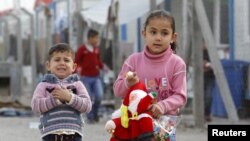Preventing violence from depriving millions of children in Iraq of education and decent healthcare is a key humanitarian priority for the country in 2016, a senior U.N. official said on Wednesday.
More than 2 million children in Iraq are out of school, up to 3 million more have had their education disrupted by the war, and nearly one in five schools have been damaged, destroyed or used for other purposes, the U.N. children's fund UNICEF says.
Of the schools that are still in use, classes are often overcrowded and lessons taught in shifts.
"We're at risk of losing a generation through the lack of education, health and protection," Peter Hawkins, UNICEF's Representative in Iraq, told the Thomson Reuters Foundation during a brief trip to Britain.
"Schools, clinics, water facilities etc are deteriorating further and further which makes the life of children very difficult. [We're] seeing increasing signs of stunting. Nutrition is becoming a problem," he said.
Nearly 14,000 teachers have fled northern Iraq where large swathes of land are held by Islamic State (IS) militants, who swept across the Syrian border in mid-2014, declaring a "caliphate" to rule over all Muslims.
Hawkins said gaining greater access to Iraqis living in areas held by Islamic State was another top concern for 2016.
UNICEF, along with the Iraqi health ministry, vaccinated up to 600,000 children against measles and polio in IS-controlled areas in 2015 but progress on humanitarian access remained "very, very slow", he added.
Iraqi Prime Minister Haider al-Abadi declared on Monday that his forces would defeat Islamic State in the coming year, after their recapture of Ramadi, capital of western Anbar province, which fell to the Islamist group in May.
Hawkins said many families had fled the contested city and were living in camps in the capital Baghdad. Many children had been uprooted several times, he added.





